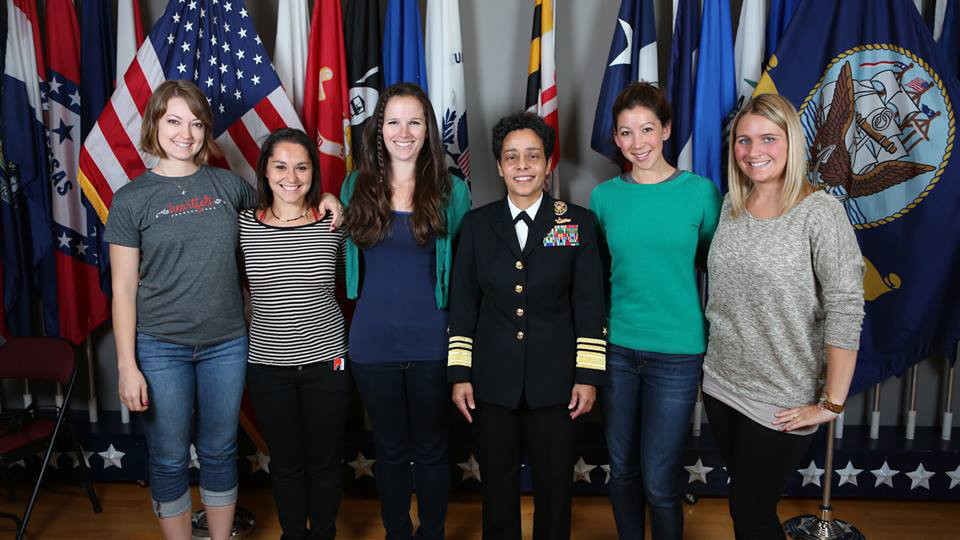Chicago-based filmmakers drove across the country to find inspiring women
chicagotribune.com - In 2013, Sarah Moshman and Dana Michelle Cook packed a minivan with camera equipment and a film crew and drove from Los Angeles to New York, capturing the stories of 17 remarkable women along the way: an astronaut, a brewmaster, an architect, an admiral and more. The road trip lasted a month. The impact, they hope, will last a lifetime.
They turned the stories into a documentary called "The Empowerment Project," and they've spent the past three years showing it in high school auditoriums and college lecture halls, in cities across the country, in countries around the world — from Haiti to Holland, from Rwanda to Australia.
On Tuesday, it was released on iTunes and Amazon.
"The film encourages girls and young women and young men to think about what they would do if they weren't afraid to fail," Cook, who lives in Lakeview, told me.
In preparation for the road trip, they launched a Kickstarter campaign to raise funds. When the campaign reached its goal, they asked the 404 people who'd pledged money to tell them whom they'd like to see profiled. The suggestions poured in.
As the number of female directors in Hollywood declines, experts ponder governmental intervention
nytlive.nytimes.com - Despite the efforts of Hollywood’s leading women to raise awareness about issues such as the gender pay gap and the obstacles faced by female directors, a new report from the Center for the Study of Women in Television and Film at San Diego State University appears to show that opportunities for women in the movie business are not increasing, but, rather, declining. According to the report, the percentage of women directors working on the 250 highest-grossing domestic releases declined from nine percent in 2015 to seven percent in 2016. The number of producers working on the top 250 films of 2016 also declined by two percent from the year before, while the number of women editors declined by five percent. Overall, 96 percent of the year’s top films lacked even a single female cinematographer.
“I would say I’m dumbfounded,” said Martha Lauzen, executive director of the center and chief author of the study. “It is remarkable that with all of the attention and talk over the last couple of years in the business and the film industry, the numbers actually declined. Clearly the current remedies aren’t working.”
Happy that feminism is being talked about in film industry: Kalki Koechlin
indianexpress.com - Kalki Koechlin, who has always been vocal about women issues, is appreciative of the on-going discussion on feminism too. Kalki Koechlin, who has always been vocal about women issues, is appreciative of the on-going discussion on feminism too. Actor Kalki Koechlin feels it is great to have a conversation about equality in the industry, and says it is important to keep the discussion going. The actress also said that it doesn’t matter if the term ‘feminism’ is only being used since it is in fashion, as long as the discussion is on.
Also read | I fear getting complacent in showbiz: Kalki Koechlin
“It is great that it (feminism seeping into the industry) is coming in conversation. I think it is our job, and we need to keep that dialogue going and not just let it be a phase or fashion,” Kalki told IANS. The actress, who has films like Dev.D, Shaitan, Shanghai and Margarita with a Straw to her credit, added: “Feminism is definitely coming into forefront because the work force is with women. It is a new thing…There are a lot of questions around it but all these questions are great.”
Punjabi Filmmaker of ‘Patiala Dreamz’ gives you ‘Phullu’,satire on women health issues
indialivetoday.com - New Delhi, Dec 28 After receiving ecstatic reviews for their Punjabi Film ‘Patiala Dreamz’, filmmakers Anmol Kapoor and Abhishek Saxena have now come up with a comic satire “Phullu”, which raises women health issues. Anmol, who was in the national capital for the promotion of the film, scheduled for release on March 8 on the occasion of International Women’s day, said,”There are many myths regarding the women menstrual cycle.
It has become a stigma in our society.
Our protagonist Sharib Hashmi (Phullu) asks questions that why sanitary pads are not used by the women.
Why they use clothes, which later leads to infection.
” “It is a dark topic.
We wanted to make it entertaining besides giving education to people.
Though there were many challenges yet the movie can change the history of India.
We want to show it in every village and city,”the filmmaker said.
Speaking about the film, ‘Filmistan’ fame actor Sharib Hashmi said, “Phullu is an innocent pure man who notices this social stigma and deals with the problem in a comic way.
New Film Production Company Focuses on Female Empowerment
An exciting new venture is in the works from leading ladies on screen—and leading female empowerment voices in movies and television. We Can Do It Together is a non-profit production company working with leading voices in the industry—both male and female—to elevate the profiles of women and other marginalized groups in movies and other forms of media. The advisory board includes Jessica Chastain, Queen Latifah, Juliette Binoche, Catherine Hardwicke, and other powerful women in the film and television industries.
The non-profit company will announce its first project at Cannes in May, and we'll be watching with great interest.
The Hollywood Reporter - A new non-profit production company called We Do It Together has been launched with a focus on female empowerment in films, TV and other forms of media.
The new banner comes with a star-studded advisory board that includes Jessica Chastain, Queen Latifah, Juliette Binoche, Freida Pinto, Catherine Hardwicke, Amma Asante, Małgorzata Szumowska, Marielle Heller, Ziyi Zhang, Haifaa Al Mansour, and Katia Lund.
The venture plans to work with male and female internationally acclaimed directors, actors, and producers to develop a slate of gender-led films, and help create opportunities for emerging voices within the industry.
The news of the company's formation comes on the heels of a year focused on the gender disparity in the industry, which led to an investigation by the Equal Employment Opportunity Commission.
Read more here.
Diversity in filmmaking: How ‘Reel Grrls’ empowers young women who have something to say
Film making is an ideal medium for telling diverse stories--but the industry continues to be dominated by straight, white men, and many young women and girls hesitate to pursue movie making. One organization has been working for nearly 15 years to combat that. Seattle-based Reel Grrls, which may expand out of the state in the near future, uses volunteer and paid mentors and teachers to show the ropes of film making to girls middle-school-age and up. As the girls grow comfortable with the technology and build confidence, it also battles another long-held bias--that girls and women are not as good with tech as boys and men.
The nonprofit is empowering girls to tell their own stories, insightful works ranging from silly to serious, and is creating a twofold pipeline to improve the situation: More girls behind the camera now means more women behind the camera in the years and generations to come; and with girls and young women telling stories, the media we all consume will start to tell a more diverse--and representative--story.
The organization focuses on educating and empowering girls and LGBT individuals, and works to build a network, making connections in the video and film industries. They teach classes including vlogging, editing, storytelling, sharing strategies and more. Click through to learn more.
geekwire.com - The video recording and editing capabilities of smartphones and tablets have made it easier than ever for would-be filmmakers to create all manner of videos. And yet the world of movie-making is still overwhelmingly dominated by white, straight men.
At least for now.
Seattle’s Reel Grrls is working to empower young women and LBGT youth to find their voice in filmmaking and learn to use everything from simple smartphone technology to high-production cinematic tools.
With the help of Reel Grrls, youth are discovering “my voice is important and I have the skills and technology available to me,” said Malory Graham, who founded the nonprofit in 2001. They realize that they have something essential to say and that no one else can say it as well as they can.
“They’re making their own media,” Graham said. “And that’s going to change the face of the media we see.”
For many, that change would be welcome. Sunday’s Academy Awards drew criticism and boycotts by movie stars upset by the absence of black, Hispanic and other non-white awards nominees. And a university study released last week measured the lack of women, racial minorities and LBGT people in movies, TV and digital series — both behind the camera and in front of it.
Read more here.
Pakistani women risking all to fight for their rights
The attack Kainat Soomro suffered is more than any 13-year-old should endure, but sadly, her victimization didn't end there—and she's not the only one to suffer sexual violence followed by victim blaming, in a troubling trend that makes victims afraid to come forward. Read an excerpt below, and click through to read more about the bravery Soomro and her family have shown in the face of stigma and tragedy; as well as the stories of other women who survived their attacks, even saw their attackers sent to jail, only to be treated as outcasts themselves. tampabay.com - KARACHI, Pakistan — Kainat Soomro was 13 years old and on her way to buy a toy for her newborn niece when three men kidnapped her, held her for several days and repeatedly raped her.
Eight years later, she is still battling for justice. She sits on a steel-framed bed in her parents' three-bedroom home and holds her blue shawl tight around her body. When she describes the horror of her captivity, her voice is barely a whisper, but it gains strength when she talks of the fight she has been waging: going to Pakistan's courts, holding protests, rejecting the rulings of the traditional Jirga council, taking on the powerful landlord and politician who she says are protecting her attackers.
The Associated Press does not usually identify victims of sexual abuse, but Kainat has gone public with her case. Her battle for justice has inspired an award-winning 2013 movie, Outlawed in Pakistan. Malala Yousafzai, the Pakistani teenage Nobel Peace Prize winner who was shot by the Taliban, invited Kainat to the Nobel award ceremony, and her fund has given Kainat financial help.
Yet Kainat's family has paid a high price for her bravery. One sister remains unmarried, and another was divorced because her in-laws were ashamed to be associated with Kainat. In 2010, her brother was killed over his sister's refusal to stay silent.
Read the rest here.














